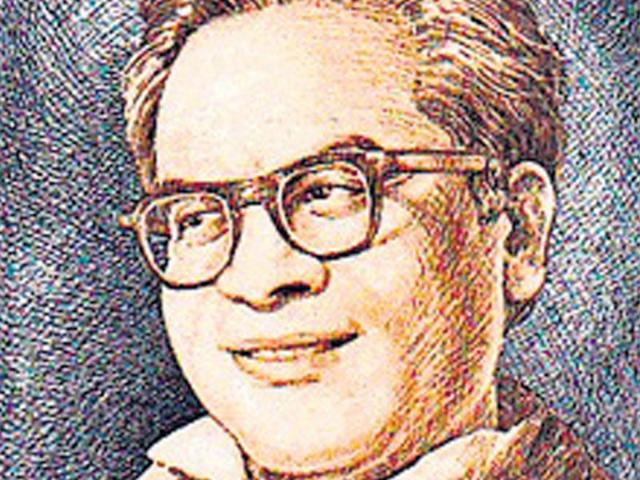Ram Manohar Lohia must be remembered for his great role in popularising socialism and creating an alternative to Nehru’s policies, but how can this be justified by allying with the Sangh Parivar ?

We remember Ram Manohar Lohia on his 50th death anniversary. Lohia (October 12, 2017).
He was a political giant who took on Nehru when the rest of the nation was in awe with him. However, to defeat Nehru, Lohia did not have any issues joining hands with the Sangh Parivar. In fact, this remains the biggest tragedy of independent India: this anti Congressism actually helped legitimise rabid communal elements. A similar thing happened when JP launched his ‘Sampoorn Kranti’ which became a ‘sawarna kranti’!
Lohia knew India’s caste arithmetic but politics is not merely about caste and communal calculations. Beyond that, Lohia’s obsession with anti-Congressism actually damaged the socialist movement. He never realised that the Sangh Parivar and its various offshoots are equally dangerous to the the integrity of the country. While it was important to fill the opposition space and fight against the authoritarianism of the Congress party, yet in doing so, any legitimacy to communal fascist forces was detrimental. The result: everywhere the Hindutva protagonists rode on the piggyback of the Samajwadis and decimated them. Jayaprakash gave these forces further legitimacy during the anti emergency movement. The Janata government came to power in 1975 and broke on the question of double membership of the some of the members of Jan Sangh with the RSS in 1979.
While both Lohia and JP were great socialists, they however never challenged brahmanical hegemony. The result is that OBCs under Lohiaism in Uttar Pradesh, though, organised, could not create an alternative of brahmanical hegemony. Challenging Congress politically and creating an alternative to brahmanism are two different things. You cannot challenge brahmanism by being part of it.
Whatever Lohia was politically, socio-culturally, he unfortunately never challanged brahmanical hegemony. I am not sure what made him suggest that Rama and Krishna was the ‘icons’ of India despite having a rational mind. Dr Ambedkar and many others have refused to accept this and we know this well through Ambedkar’s Riddles of Hinduism.
But one thing is clear. Lohia was a definitely politician with superior intellect. At a time when it was difficult to take Nehru on, Lohia did so in equally strong terms and with great oratory. My lasting regret is why Lohia could not or did not meet Dr Ambedkar. Though we have information now which suggests that Lohia wanted Ambedkar to be the leader of RPI and had shown willingness to join the movement led by Dr Ambedkar, this did not happen. It was unfortunate that Dr Ambedkar passed away in December 1956 and the party he envisioned actually could not do anything specific related to this. It is also a fact that RPI had a strong presence in Uttar Pradesh and Punjab for many years.
Right now, the challenge is huge and the movement of the OBCs has moved ahead. Lohia’s failing was that he could not create a visionary leadership which could take over the movement. In the name of Bahujans, OBC leaders in Uttar Pradesh have reduced themselves to chanting Lohia-isms while remaining foot soldiers of the Brahmanical social order. It is time they now join the broader Dalit Bahujan movement led by Jyoti Ba Phule, Baba Saheb Ambedkar and EVR Periyar who gave people of India a new identity and strength to fight against all kinds of social evils, providing them with alternative paths.
Varnashram dharma is using all the tricks in the book to keep the foot soldiers within its fold. Lohia did not have the strength to fight against this as he did not provide any alternative to it which could be challenge the caste hegemony of the Dwijas. He did not provide any alternative cultural vision which Phule, Ambedkar and Periyar provided to people.
We do not support Lohia’s Hindi fanaticism or anti Englishism as it will not take India anywhere particularly its vast Dalit Bahujan masses who have been denied right to education and knowledge by the Varna-ashram dharma. We need a counter culture of India’s Bahujan masses, that is humanistic in nature where the philosophy revolve around human being and not laying down our lives for a fictitious God or gods.
Of course, we must not deny his great contribution to politicise the concerns of the OBCs; however the battle is not merely political but cultural too. Lohiaism is status quoist and ends up at the feet of Gandhism which the vast numbers of Dalit Bahujan masses have already rejected as it does not inspire them.
Ram Manohar Lohia must be remembered for his great role in popularising socialism and creating an alternative to Nehru’s policies, but how can this be justified by allying with the Sangh Parivar ?